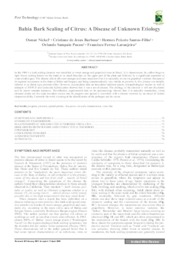Bahia bark scaling of citrus: a disease of unknown etiology.
Bahia bark scaling of citrus: a disease of unknown etiology.
Autoria: NICKEL, O.; BARBOSA, C. de J.; SANTOS-FILHO, H. P.; PASSOS, O. S.; LARANJEIRA, F. F.
Resumo: In the 1960's a bark scaling disorder was identified in sweet orange and grapefruit trees in Brazil. It is characterized by yellow-beige to light brown scaling lesions on the trunk or on small branches on the upper part of the plant and followed by a significant exudation of water soluble gum. The disease affects all sweet oranges and some mandarins but it is especially severe on grapefruit varieties. Because of its regional occurrence in the states of Bahia and Sergipe, and being symptomatically very similar to psorosis A, this disease was initially referred to as Bahia type psorosis (tBa). However, accumulated data on inoculated indicator plants, histopathological studies as well as attempts of RT-PCR and molecular hybridization showed that it was a novel disease. The etiology of the disorder is still not elucidated and its nature remains unknown. Nevertheless, experimental data on its epidemiology showed that it is naturally transmitted, citrus diseased plants are the main inoculum source and its progress and spread is consistent with a disease vectored by an insect of limited dispersion ability. Currently the work is aiming at the identification of the pathogen and its vector.
Ano de publicação: 2007
Tipo de publicação: Artigo de periódico
Unidade: Embrapa Uva e Vinho
Palavras-chave: Bahia, Brasil, Casca, Citro, Descascamento, Doença de Planta, Fruticultura, Transmission, Virus-like
Observações
1 - Por padrão são exibidas publicações dos últimos 20 anos. Para encontrar publicações mais antigas, configure o filtro ano de publicação, colocando o ano a partir do qual você deseja encontrar publicações. O filtro está na coluna da esquerda na busca acima.
2 - Para ler algumas publicações da Embrapa (apenas as que estão em formato ePub), é necessário ter, no celular ou computador, um desses softwares gratuitos. Sistemas Android: Google Play Livros; IOS: iBooks; Windows e Linux: software Calibre.
Acesse outras publicações
Acesse a Base de Dados da Pesquisa Agropecuária (BDPA) para consultar o acervo completo das bibliotecas da Embrapa.

